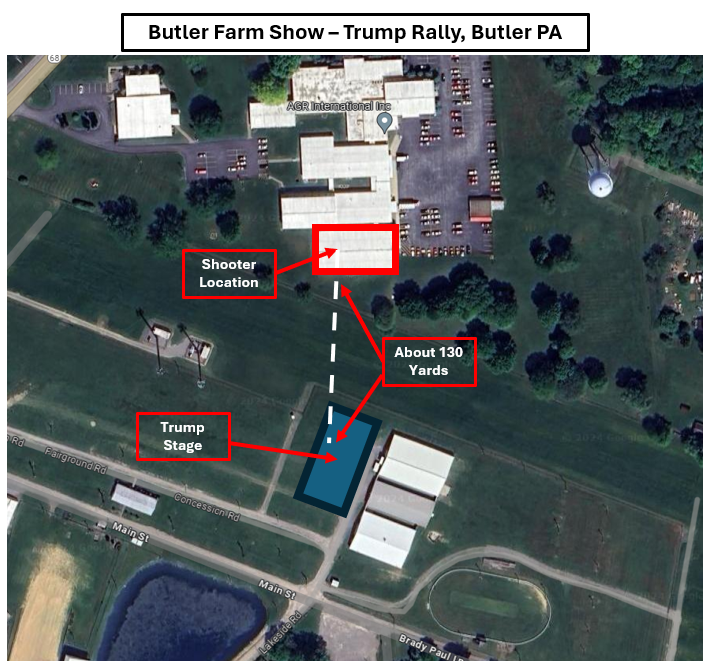In an appalling and entirely avoidable occurrence, an armed assailant shockingly fired shots at ex-President Donald Trump during a political gathering in Butler, Pennsylvania. The Secret Service had previously pinpointed a nearby rooftop as a potential security threat. However, despite this knowledge, the building remained unprotected, providing the attacker with an opportunity to position himself and open fire.

This incident has ignited a storm of blame and queries regarding who should be held accountable. Both the Secret Service and local law enforcement were part of the security arrangements. However, the onus of responsibility rests firmly on the Secret Service. As the primary agency tasked with safeguarding our leaders, they should have ensured complete coverage of all security loopholes, particularly those already identified.

Ignored Red Flags
The building from which the shots were fired was owned by a glass research firm and situated adjacent to the Butler Farm Show venue. It was a mere 130 yards from the stage, well within the range of a semi-automatic rifle. According to insider information, the Secret Service was aware of the risk posed by this rooftop. A former high-ranking Secret Service agent expressed that someone should have been stationed on the roof or securing the building to prevent unauthorized access.
Regrettably, this did not occur. Instead, the task of securing the rooftop was delegated to local law enforcement by the Secret Service. While such delegation is common practice, it does not excuse the Secret Service from their duty to guarantee thorough security. The glaring failure to secure this vital point indicates a serious lapse in judgment and coordination.
A Fatal Consequence
Just minutes into Trump’s address, a series of shots were heard. Trump instinctively reached for his right ear, later revealed to have been grazed by a bullet, and fell to the ground as Secret Service agents scrambled to shield him. Trump emerged with blood on his ear and face. In a tragic turn of events, one attendee lost their life and two others were injured. The shooter, identified as 20-year-old Thomas Matthew Crooks, was ultimately shot dead by Secret Service personnel.
Eye-witnesses beyond the event’s security perimeter had even alerted law enforcement about the gunman just minutes before he started shooting. Despite these urgent warnings, the shooter was able to unleash havoc, resulting in chaos and tragedy.
The Accountability Question
Butler County District Attorney Richard Goldinger pointed out that the Secret Service was responsible for the overall security and role assignment. Local law enforcement, including sniper and quick response teams, were involved but failed to secure the rooftop from which Crooks opened fire.
This incident has been labeled as the most significant failure of the Secret Service since the assassination attempt on President Ronald Reagan in 1981. Ex-agents and security experts are questioning how such a fundamental oversight could have happened. Anthony Cangelosi, a former Secret Service agent, emphasized that even if local law enforcement faltered, the ultimate responsibility of mitigating all threats lies with the Secret Service.
The Larger Concern
Aside from this specific blunder, there are grave doubts about the overall competency of the Secret Service. Under Director Kimberly Cheatle’s leadership, the agency has heavily invested in Diversity, Equity, and Inclusion (DEI) initiatives. However, these DEI objectives are proving to be detrimental to organizations like the Secret Service when it comes to matters of life and death. The primary focus should always be on hiring the most capable individuals, irrespective of race, gender, or any other non-merit based factor. This unhealthy obsession with DEI is likely diverting attention from the core mission of protecting our nation’s leaders, leading to a decline in the agency’s effectiveness and operational readiness.
Closing Remarks
The shooting at Trump’s rally in Butler, Pennsylvania reveals serious flaws in the Secret Service’s security strategy. While local law enforcement played a part, the main responsibility rests with the Secret Service. Failing to secure an area known to be risky is simply unforgivable. As the agency struggles with its priorities, it must not lose sight of its most vital duty: ensuring the safety of those under its protection. It’s high time for the Secret Service to revisit their strategies and refocus on their core mission to prevent such oversights from recurring.
We welcome your thoughts on this situation. Feel free to share them in the comments section below!
Source: Steadfast and Loyal


Leave a Comment